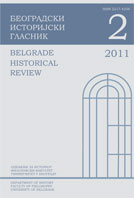NADZOR I KONTROLA STRANACA U 18. VEKU – SLUČAJ HABZBURŠKE MONARHIJE
SUPERVISION AND CONTROL OF FOREIGNERS IN EIGHTEENTH CENTURY. THE CASE OF THE HABSBURG MONARCHY
Author(s): Jovan PešaljSubject(s): Diplomatic history, Economic history, 18th Century, The Ottoman Empire
Published by: Филозофски факултет, Универзитет у Београду
Keywords: 18th Century; Habsburg monarchy; immigration policy; Ottoman empire – commerce; sanitary policy; identification
Summary/Abstract: Th is paper is interested in supervision and control of foreigners from the Ottoman Empire in the Habsburg monarchy in the second half of the Eighteenth century. Their entrance into Habsburg provinces was controlled effectively through the institution of the sanitary cordon at the Ottoman border. Since the Treaty of Passarowitz (1718) Vienna has tried to challenge the status and trade privileges enjoyed by Ottoman merchants in the Habsburg monarchy, but without much success until the reigns of Maria Theresa and her sons. The important steps were taken in late 1760s and early 1770s, to regulate entrance, travel and residence of Ottoman subjects, to make provincial and a central registers. Through the registers and the introduction of obligatory travel documents, the travel and residence of Ottoman subjects was put under effective supervision and control. It encouraged many Ottoman subjects to naturalize, especially after the abolishment of internal customs and after issuing toleration edicts for non-Catholics. Measures of supervision and control were then introduced on a national level in 1801.
Journal: БЕОГРАДСКИ ИСТОРИЈСКИ ГЛАСНИК
- Issue Year: 2011
- Issue No: 2
- Page Range: 177-190
- Page Count: 14
- Language: Serbian

